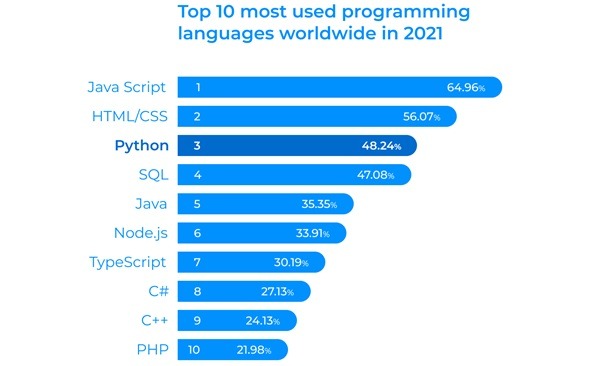The choice of programming language is a crucial step for different-sized companies, especially for startups. They face the task of choosing a programming language at the stage of creation of an MVP or presentation of the concept. The most widespread difficulties are ambiguity about the future of projects, limited budgets, lack of experience, a shortage of diverse professionals, and a need for support.
In addition to these difficulties, there are certain requests, such as an affordable price, the ability to launch a project in a couple of months, versatility, and scalability in the future. Being new and not stable organizations, the necessity to build a strong and sustainable base under it becomes one of the circumstances of development.
According to these requirements, Python is considered to be the best programming language for startups and small businesses. It has a stable reputation and in its 30 years of existence, it has not lost relevance. So we decided to find out if this is really the case by looking at the benefits of using Python specifically for startups.
Statista
Advantages of Python for startups
1. User-friendly language with a supportive community
Python was originally intended to be a programming language accessible for both learning and use. Its simple syntax makes it intuitive to read and work with, which in the case of startups, saves development time and money. All the necessary theoretical and practical information is publicly available, and you can turn to the Python community to find the right solution.
By choosing Python, you don’t need a large development team or a multistep division of responsibilities. This doesn’t affect development time, but fortunately for young businesses, it reduces the price.
You also have the option to utilize online Python compilers such as Newtum. It functions as a Python online compiler similar to other compilers, but with the added feature of AI integration. This means that users can make queries, and the Python online compiler, backed by AI, will generate the corresponding program. Furthermore, it provides comprehensive code explanations and covers relevant topics. Users can execute the code within the platform and even share it with fellow users.
2. Flexibility and versatility
Python can be found in completely different areas, from the familiar web and game development to artificial intelligence, machine learning, computer security, Big Data, the creation of bots for social networks, and parsing programs.
This versatility also applies to the ability to create code for all existing platforms (macOS, Windows, and Linux). By choosing Python as a startup programming language, there is no need to contact several development teams. The product will be available on all operating systems.
3. Scalability
Scalability is one of the crucial benefits of Python. It will be relevant at the startup stage as well as for a large project because it will be able to expand with the growth of the company and, consequently, its users.
4. Easy MVP building
Once the idea on How to start a tech startup has been validated, it’s time to start building a prototype or MVP (minimum viable product). The MVP should be something that solves the problem and is not too complicated.
Most startups face the need to create an MVP — a minimum viable product. Its purpose is to attract users and investors and gather feedback. At such an uncertain stage, no one wants to take a risk and invest large sums in developing a project that may not pay off. And that’s one of the advantages of Python over other languages. The possibility to do MVP quickly and inexpensively, and then make adjustments to the application based on feedback and queries. Also, through Python’s high software security, the code is protected from external threats.
5. Open-source and free
Python is free to use, but that’s not the only good news for startups. Open source means that the code is in the public domain for reading, changing, and improving. It also allows users to modify the code to suit the projects they need.
6. Testing facilities and standard libraries
TDD (test-driven development) support allows you to immediately test prototypes and later refactor them into complete applications. This Python approach, compared to other languages, reduces development time and cost. Another advantage is a massive and diverse arsenal of libraries and optional extensions. With their help, startups can pick up functionality for any type and sphere of the concept.
Are there any disadvantages of using Python?
Of course, nothing is perfect, especially in development. Everything has two sides, and Python also has a few problem areas.
- Memory Consumption. Python does indeed use a lot of memory, but there are ways to optimize it.
- Python’s low-speed relative to other languages is because, while the code is simple and readable, a wide variety of tasks can be performed with it.
But all these shortcomings, too, are solvable with the support of a team of professionals and using additional tools.
To summarize, Python has all the necessary qualities to meet the demands of growing companies. Solid reputation, security, affordable price, and flexibility. However, given the intricacies and availability of problem areas, despite budget limitations, startups are better off going to experts in Python development. The work with professionals will help to avoid difficulties and get high-quality results faster.



